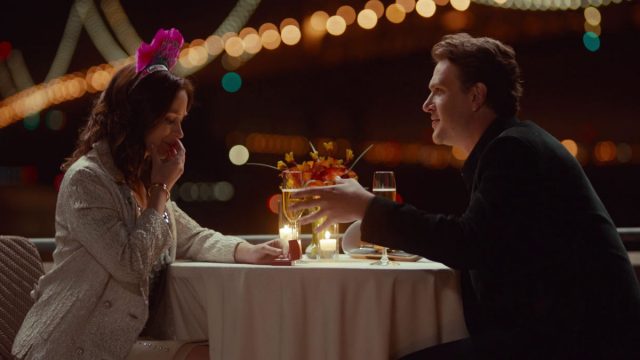The Five-Year Engagement is technically a romantic comedy, but–like a lot of Apatow-adjacent projects–it’s more like an adult coming-of-age dramedy with a deliberately prickly, compromise-heavy romance inside it. Its greatest strength is probably how well it captures unhappiness, which isn’t a compliment you give many romantic comedies.
Tom (Jason Segel) and Violet (Emily Blunt) get engaged, but before they can actually pull the wedding together, Violet gets offered a post-doc position in the psychology program at the University of Michigan in Ann Arbor. She’s worried he’ll resent her if she takes it, since he’ll have to leave his sous-chef job, but Tom bites the bullet immediately. It’s only two years, this is a huge opportunity for her, and he can cook anywhere. But even though he tries to handle it all gracefully, it’s not a situation where both people can be equally happy.
In Ann Arbor, Violet blossoms, with her psychological study on impulse control attracting praise and grant money, and Tom wilts. His career is on hold, and the fact that he left a successful restaurant in San Francisco to move to Ann Arbor acts as a kitchen punchline. He’s finally able to get work at the real-life hip deli Zingerman’s, but while the place has a funky, artisanal energy and he likes his coworkers, he’s still just making sandwiches all day. When he’s at cocktail parties with Violet, he finds himself in that awkward position where you have to say, “Well, I’m really a [x], but right now I’m working at [y].” He’s unhappy, and Violet knows it. But when the chance to extend her program comes up, she still takes it, and the two enter a new, grimmer status quo/stagnation where Tom scrambles for interests and self-fulfillment while Violet tries to smile her way through pretending she doesn’t find her new hunting-crazed, bearded fiancé somewhat alarming and embarrassing.
In the background, for contrast, Tom’s best friend, Alex (Chris Pratt), and Violet’s sister, Suzie (Alison Brie), hook up, discover Suzie is pregnant, get married, and quickly add a second and third kid to the mix. Alex gets the chef job Tom would have had if he’d stayed in San Francisco. This second love story gives the plot a structure that feels interestingly like a Victorian novel, as if the movie is trying out different ways for people to find happiness and stability. Suzie and Alex at first seem like they’ll be one of those standard-issue shrew/manchild acts, but while they have some real, persistent issues, they also wind up with a clear long-term physical passion, a happiness in parenting their kids, and a shared kind of goofiness. If The Five-Year Engagement has a thesis, it appears to be that you can’t necessarily compromise your way to happiness, but you can maybe commit your way to it.
The story has an appealing shagginess that, amazingly, doesn’t actually feel like overgrown improv comedy with minimal editing. Instead, it’s just a kind of textured pile-up of incidents in a way that works because it has to evoke some sense of time passing and life moving on. And it balances humor and drama well and with a nice sense of specificity: its signature scene might be Violet and Suzie trying to have a serious discussion about marriage, striving for perfection, settling, and life goals while Suzie’s kids have demanded they speak entirely in character as Elmo and Cookie Monster.
The film is arguably harsher on Violet than on Tom, doling out more and harsher comeuppance for her relationship sins, and it has a kind of bedrock social conservatism that could be a turn-off. But all in all, it’s one of the more interesting and emotionally nuanced off-shoots of the short-lived wave of Apatow-style romantic comedies.

